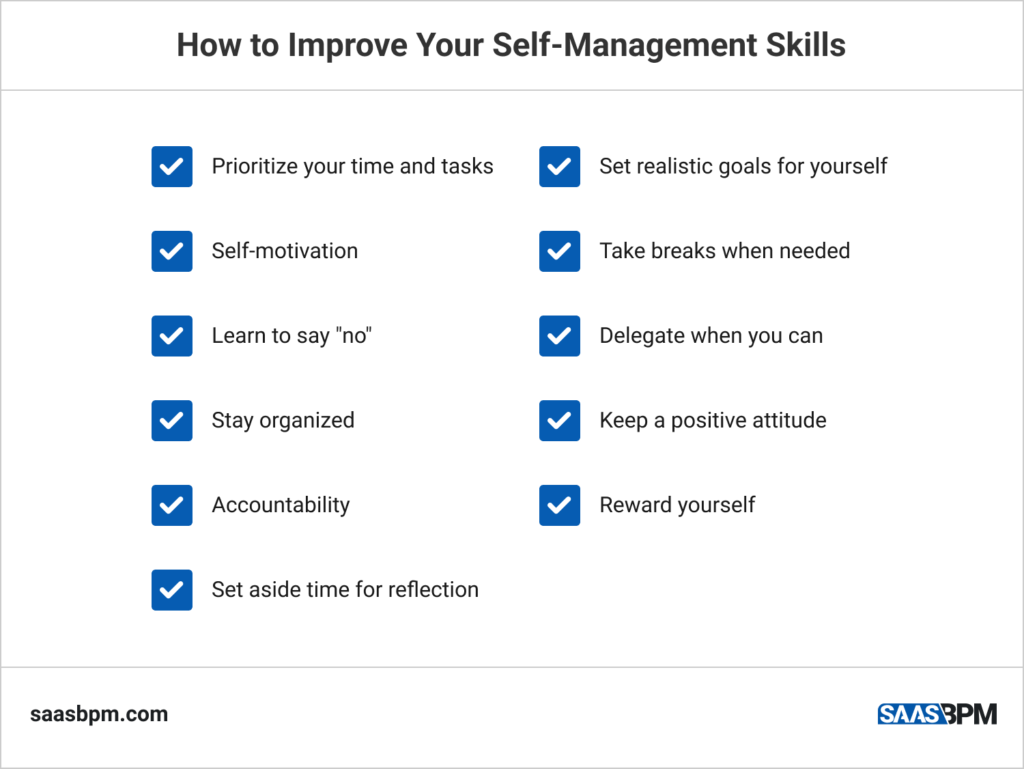Self-management skills are essential for better work productivity. However, many people don’t realize this and struggle to organize their time effectively. Here are a few self-management tips to help you improve work productivity and get more done each day. Implement these tips into your routine and see how much of a difference they can make!
What Is Self Management?
Self-management is the ability to effectively manage oneself in order to achieve goals. This includes time management, organization, goal setting, and other similar skills. Self-management is an important skill to have both in and out of the workplace.
Why Is Self Management Important for Productivity?
Self-management skills are important for productivity because they allow you to better manage your time, set and achieve goals, and stay organized. When you have a good handle on these qualities, it is much easier to get things done and be productive.
How to Improve Your Self-Management Skills

There are a few key things you can do to improve your self-management skills. First, focus on setting realistic goals for yourself. Once you have a goal in mind, break it down into smaller steps that you can take to achieve it. This will help you stay on track and avoid getting overwhelmed.
It is also important to develop a good time management system. This may involve setting a daily or weekly schedule or using a productivity app to keep track of your tasks. Find what works best for you and stick to it.
Finally, make sure to stay organized. This includes both physical organization (such as keeping your workspace clean) and mental organization (such as keeping a to-do list). When you are organized, it is much easier to stay on top of things and be productive.
Below, we’ve broken down self-management into 8 steps to improve productivity at work:
1. Prioritize your time and tasks
One of the most important self-management skills is learning how to prioritize your time and tasks. This means taking a few minutes each day to assess what needs to be done and setting priorities accordingly. For example, if you have an important project due at work, that should take precedence over less pressing tasks.
2. Set realistic goals for yourself
Another key self-management skill is setting realistic goals for yourself. Take the time to think about what you want to achieve and then create a plan of action to make it happen. Trying to accomplish too much at once will only lead to frustration and ultimately, poor productivity.
3. Self-motivation
Keeping up your self-motivation all the time can be challenging, especially when there are external factors that distract you. However, mastering this skill is essential to retaining your focus and completing tasks with great determination!
The first step toward being productive in life or work lies within having an upbeat attitude about what you do. This helps to stay on track because it makes any task seem less daunting than if taken at face value before starting (think: “This would take forever!”). It also helps prioritize certain goals over others by giving them greater importance.
4. Take breaks when needed
Although it’s important to stay focused, it’s also crucial to take breaks when needed. This will help you avoid burnout and maintain a high level of productivity. When you start feeling overwhelmed or stressed, step away from your work for a few minutes to clear your head. You’ll be surprised how much better you’ll feel afterward and how much more productive you’ll be.
5. Learn to say “no”
One of the hardest self-management skills to learn is saying “no.” However, it’s an important one if you want to be successful. There will always be people or requests that try to take up your time, but it’s important to know when to say “no” in order to stay focused on your own goals.
6. Delegate and build a support network

Another self-management skill that’s important is learning how to delegate tasks and build a support network. This means finding people you trust to help you with certain tasks or projects. Not only will this free up your time, but it will also help reduce stress levels.
7. Stay organized
One of the best self-management skills you can learn is staying organized. This means taking the time to create a system that works for you and then sticking to it. Having a place for everything will help you stay on track and avoid feeling swamped by your work.
8. Keep a positive attitude
One of the most important self-management skills is keeping a positive attitude. No matter how challenging a task may be, approached it with a positive outlook and you’ll be more likely to succeed. A positive attitude will also help you stay motivated and increase your overall productivity.
9. Set aside time for reflection
It’s also important to set aside time for reflection. This means taking a few minutes each day to think about what you’ve accomplished and what still needs to be done. This will help you stay on track and make sure you’re making progress toward your goals.
10. Accountability

Accountability is a very important concept. It means that you are responsible for your actions. When something goes wrong – as it will sometimes!-you don’t try to find any excuses but rather take full responsibility in order to fix what’s been done wrong so next time around things go better than before.
It’s really easy to blame someone else who could be at fault. After all, nobody wants their mistakes spoken about freely without due consideration given towards themselves first… If you are an accountable person, your colleagues will consider you trustworthy. They’ll ask for help when needed because they know that with consistency in work ethic comes success!
11. Reward yourself for a job well done
Last but not least, don’t forget to reward yourself for a job well done. This doesn’t mean you should go overboard, but a little treat now and then can help you stay motivated. Choose something that you’ll enjoy and that will help you relax after a long day of work.
Final Thoughts
In order to be productive, it’s important to have good self-management. The eight skills we’ve shared can help you work more efficiently and effectively. While not an exhaustive list, these are some of the most important self-management tactics to develop in order to boost your productivity. If you want to learn more about how to improve your self-management skills, or if you need help implementing any of these principles into your workflow, contact us today. We offer business process management software – SaaS BPM, that can help optimize your workflows and make you more productive.

